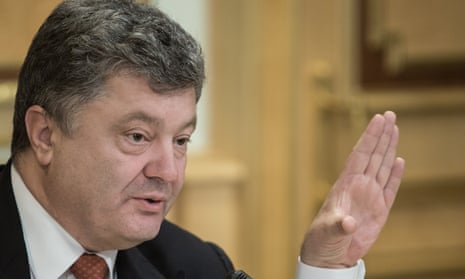President Petro Poroshenko has reversed his decision to ban three BBC journalists from Ukraine after an international outcry.
Correspondent Steve Rosenberg, producer Emma Wells and cameraman Anton Chicherov were among 400 people and 90 organisations barred from Ukraine, according to an expanded sanctions list against people posing a “threat to national security” signed by Poroshenko on Wednesday.
Many Russian officials, journalists and television channels were also banned, as well as two Spanish journalists who went missing in Syria in July.
After the move to bar the British journalists caused a minor uproar, Poroshenko ordered the national security council to remove the names of the BBC employees from the list.
The president informed the new UK ambassador to Kiev, Judith Gough, of the change while presenting her with diplomatic credentials on Thursday, spokesman Svyatoslov Tsegolko wrote on his Facebook account.
Свобода преси для мене абсолютна цінність.-Президент доручив РНБО вилучити прізвища журналістів ВВС з санкційного списку. РНБО зробить заяву
— Svyatoslav Tsegolko (@STsegolko) September 17, 2015
“Freedom of the press is an absolute value for me,” Petroshenko told Gough, according to the post.
Poroshenko said the list targeted people involved in Russia’s 2014 annexation of Crimea and the aggression in eastern Ukraine, referring to the conflict with Russia-backed rebels that has continued in certain hotspots this year despite a February ceasefire.
The New York-based Committee to Protect Journalists (CPJ) said it was deplored by the decision to list journalists. “While the government may not like or agree with the coverage, labelling journalists a potential threat to national security is not an appropriate response,” it said in a statement.
The ban on the two Spanish journalist was also lifted but Ukraine’s information policy ministry said Cesar Vidal - a Spanish radio host and historian - would remain on the list because he had allegedly referred to Ukraine as “an artificial state that is being used (by the West) as a weapon to threaten the Kremlin”.
The ministry said it would keep “propaganda-spouting” Russian media personalities, such as the virulently anti-Western weekly TV show host Dmitry Kiselyov, out of the country for the coming year.
The ban was on Thursday further broadened to include former Italian prime minister Silvio Berlusconi because he visited Crimea last week with the Russian president, Vladimir Putin.
